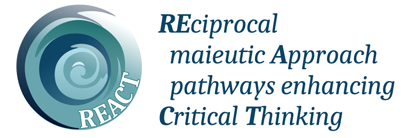REACT project’s activities are addressed to multiple target groups.
Directly, the project impacts students aged 10-15 years old that will benefit from the laboratorial activities in 6 EU countries. During this period of life, research of autonomy often manifest itself as a priori opposition and the prevailing emotions in youngsters, not yet able to adequately process their emotional states, are the poles of enthusiasm and suffering. This polarization makes young people more attracted to extreme ideologies and positions. Moreover, the inclusion in the mainstream of education provision does not guarantee that the students individual needs will be met. Students should be “placed at the centre of the framework” (OECD, 2013) and this implies that students are given responsibility for their own learning. Applying the RMA as a cooperative and dialogic learning tool, combined with a proper attention to learning environment rebuild and application of observation principle will engage students with their learning, contributing to the definition of their needs (not only the educative ones) and then to the planning and organisation of proper responses.
Teachers of lower and upper middle schools are impacted by the project’s activities as well. The role of education in preventing extremisms has only recently gained global acceptance (UNESCO, 2016). Recent researches and EU projects’ results demonstrate that teachers do not have an adequate training offer available on the issues of development of critical thinking in terms of preventing extremism. The majority of the studies reported critical thinking aims that were limited to the cognitive level, underrating the fact that critical thinking is only developed with considerable practice and effort. REACT will give teachers practical tool to better understand inner needs of students in this peculiar growth phase through the development of critical thinking skills to apply also outside the RM labs in all the other educative contexts such as lessons. In addition, while teachers can prepare and pre-plan lessons and discussions as part of the day lesson on sensitive topics, if trained to do so, there are other entry points for discussion that may occur on the spur of the moment. REACT RM laboratories will be considered as “teachable moments”, opportunities that should be seized to explain concepts difficult to understand and where teachers can learn (practically, being participants, experiencing themselves) how prepared, both personally and professionally they should be in order to not miss these opportunities in other educative moments.
As demonstrated by previous researches, parents have training needs related to their educational role, but there is a general lack of opportunities to share them with professionals and/or other parents and become fully aware of them. The proposals addressed to them have a low participation, because quite often are organized without an active involvement methodology. This leads parents, when they need help in resolving conflicts with their children, to contact other subjects belonging to their “intimate” network. Moreover, it is precisely in the transition phase between childhood and adolescence that parents feel they need help most. Parents also play a key part in whole school approaches and community schooling, and these have been shown to be effective tools in promoting social inclusion, through shaping students’ attitudes towards other cultural groups. Parental involvement is linked not only to academic results but also to children’s social and emotional development. REACT will involve parents in the core phase of the activities, making them responsible and key actors in the development of critical thinking skills. The competences acquired during the RM labs will be key in building a better conflict-resolution strategy in familiar and educative contexts.
The Educating Communities, embedding the key educative actors that play a role in the psycho-physical development of youngsters, often suffer a lack of coordination of the various actions undertaken at different levels. Activities organized officially by school; events promoted by sportive/cultural/third sector organizations addressed to students and/or parents; other activities promoted by third organisations somehow linked to the network of schools (e.g. the RM labs developed in the framework of EU/national/local projects) are often perceived as “spot” interventions, unrelated to each other. By not taking the form of an articulated path, these actions often lack long-term impacts. Implementing a comprehensive community approach, REACT project aims at building a strong, coordinated and long-term path involving all the actors of the educating community, thus contributing to the psychophysical development of youngster, the professional competences improving of teachers, sense of responsibility of parents and involvement of all the other actors of the educating community in a long-term perspective and with a solid impact.
Also policy makers will benefit from a systematic formative and summative evaluation plan of REACT activities, focused on their needs in order to reproduce successful outcomes of the project in other EU educational contexts. They will be also involved in disseminative actions at local, national and European level.
